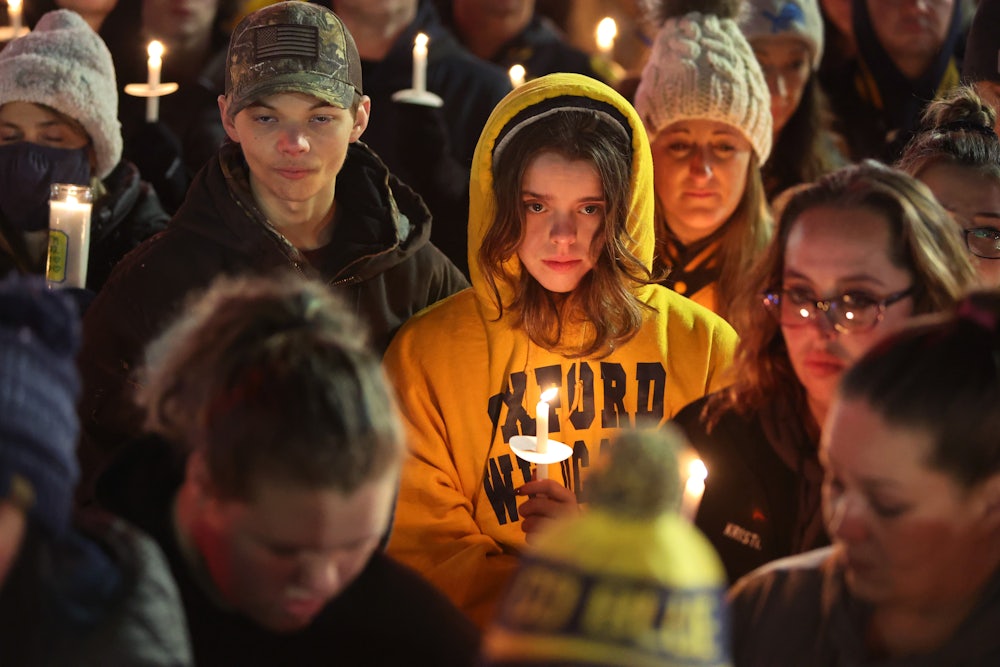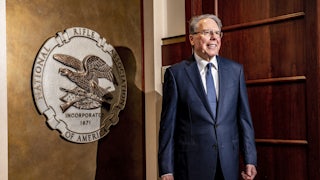The series of events that inspired a prosecutor in Michigan to charge a school shooter’s parents with involuntary manslaughter are staggering. The gun with which 15-year-old Ethan Crumbley allegedly killed four classmates at Oxford High School in Oxford, Michigan, had been an early Christmas gift, purchased by his father the day after Thanksgiving while the teenager stood at his side. “My new beauty,” Crumbley called it on social media, and it was stored, unlocked, in his parents’ room for less than a week before he brought it to school. The day before the November 30 shooting, a teacher told Crumbley’s parents she’d seen him searching for ammunition online during class. “LOL I’m not mad at you,” his mother texted. “You have to learn not to get caught.” A day later, Crumbley’s parents were called to an emergency meeting after a teacher found a threatening note. The parents refused to have Crumbley removed from the school and didn’t ask their son about the handgun, which a few hours later he pulled from his backpack and started to fire.
At a news conference on Friday, Oakland County Prosecutor Karen D. McDonald explained her reasoning behind the rare charge against Jennifer and James Crumbley. “I am in no way saying that an active shooter situation should always result in a criminal prosecution against parents, but the facts of this case are so egregious,” she said. Though the parents of school shooters are often scrutinized, this appears to be the first instance in which they have been criminally charged for students’ deaths. In 2015, families of the children killed at Sandy Hook Elementary School by Adam Lanza sued the estate of his mother, Nancy Lanza, because she had left her rifle unsecured in her home (the case settled for $1.5 million); that same year, Laurel Harper, the mother of the Umpqua Community College shooter, came under intense scrutiny for her pro-gun posts online. But a Washington Post database tracking school shootings between 1999 and 2018 found guns used in these incidents were taken from a minor’s home 84 times; in only four of those shootings were the adults who owned the weapons criminally charged for not keeping them locked. Michigan, unlike many other states, doesn’t have a law that would hold gun owners liable for leaving their firearms unlocked around kids, removing that option in this case.
In the immediate aftermath of a mass shooting, there is often a scramble to assign definitive blame: Was it the U.S. mental health apparatus, school administrators, or a failure to catch inflammatory posts online? Donald Trump famously blamed video games, though a connection there was long ago debunked. Gun rights advocates tend to invoke a generalized sense of societal decline, as well as a lack of “parental support.” Sometimes the engine of an act of violence is glaringly obvious. In Crumbley’s case, his parents’ fondness for firearms appears to have been paired with an incomprehensible blindness toward obvious cues.
But the day after the press conference in which the charges against the Crumbleys were announced, the Nevada Supreme Court ruled on another gun case that could have assigned a more wide-ranging and consequential form of blame. Unfortunately, the court decided against the parents of a woman who was killed by Stephen Paddock at the Mandalay Bay Hotel in Las Vegas in 2017, and in favor of Colt and other gun manufacturers. Like a number of similar plaintiffs, the parents of Carrie Parsons, a Seattle native who was 31 when she was killed, argued that the people who created the rifle used in the shooting had a “reckless lack of regard for public safety,” advertising the gun as a “military weapon” and signaling how easily it could be modified to fire automatically. In attempting to sue firearms manufacturers, they join recent legal proceedings brought by the survivors of a shooting in Dayton, as well as a messy ongoing suit against the now-bankrupt Remington, spearheaded by the parents of children killed at Sandy Hook. (The government of Mexico has also sued American gunmakers, arguing that 70 percent of weapons trafficked into the country come from the United States.)
Historically, these sorts of suits have all failed. That’s because in the early 2000s, the National Rifle Association, arguing that gun manufacturers didn’t have the money to pay out damages, successfully lobbied to pass the Protection of Lawful Commerce in Arms Act, which shields companies from responsibility except in very specific circumstances, as when a gun is defective and explodes. Of course, those companies do have quite a bit of money, a significant chunk of which they have funneled to further their political projects through massive donations to entities like the NRA—which in turn lobby to soften the child access prevention laws that would have otherwise been used to charge Crumbley’s parents for his alleged crime.
Though it’s generally unwise to try to identify a single
cause for America’s massive, unwieldy problem with guns, the alliance between
gun manufacturers and lobbying groups is almost always around the edges of
incidents like the one in Michigan. Without the political power conferred by
massive donations, Second Amendment groups wouldn’t be able so successfully to dismantle laws that, at the very least, might scare people into properly
locking and handling their guns. Without people like Dana Loesch offering gun
ownership as a way to ensure
liberals “perish in the political flames” or organizations like Gun Owners
of America awarding Kyle
Rittenhouse an
honorary AR-15, maybe Crumbley’s parents would be less likely to offer
their 15-year-old a weapon and treat it as a personality trait. I’ve gotten
three fundraising emails from the latter organization since the shooting on
November 30. In the most recent, Gun Owners of America wants me to defend
liberty by buying a $45 Christmas ornament featuring Santa holding an A.R.








